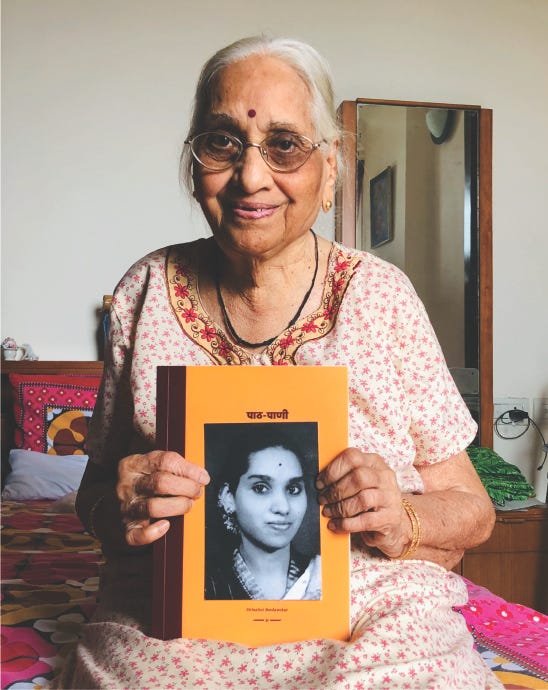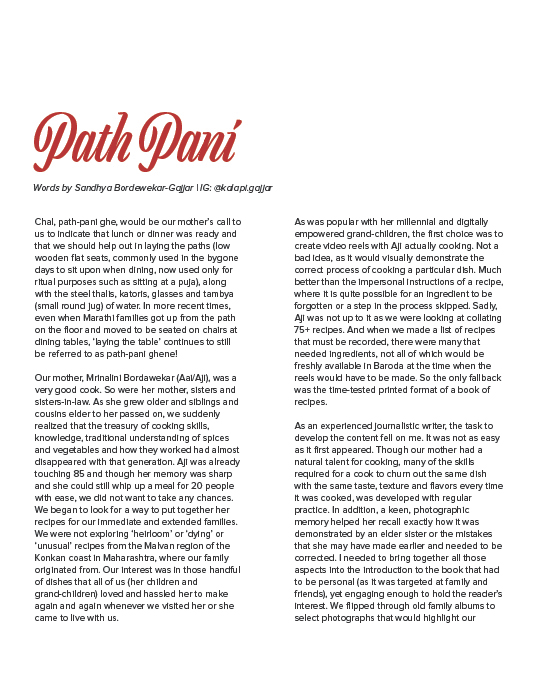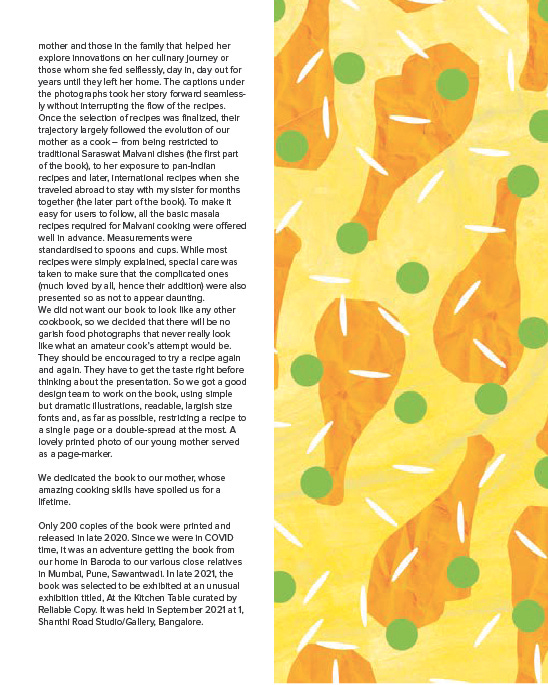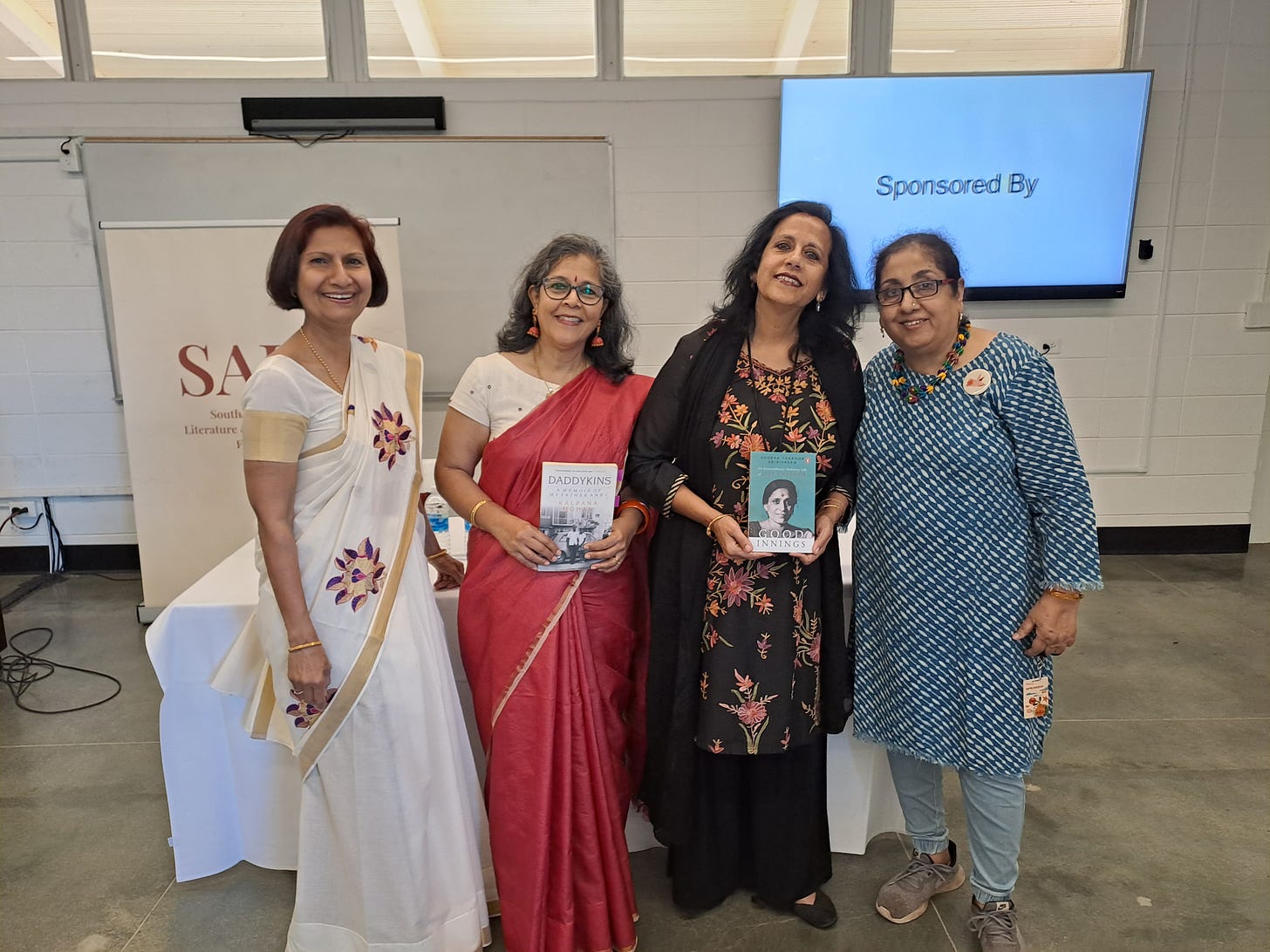My mother, Mrinalini Bordawekar (Aai/Aji), was a very good cook. So were her mother, sisters and sisters-in-law. As she grew older and the siblings and cousins elder to her passed on, we suddenly realized that the treasury of cooking skills, knowledge, traditional understanding of spices and vegetables and how they worked, has almost disappeared with that generation. So a few years back, the family decided to record some of the much-loved recipes of the khana my mother had been preparing for years, as a kind of acknowledgement of her immense talent as a wonderful cook who continuously expanded her repertoire of exciting traditional and new recipes, learning from a range of sources. But we were not exploring ‘heirloom’ or ‘dying’ or ‘unusual’ recipes from the Malvan region of the Konkan coast in Maharashtra, from where our family originated. Our interest was in those handful of dishes that all of us (her children and grand-children) loved and hassled her to make again and again whenever we visited her or she came to live with us.
As was popular with her millennial and digitally empowered grand-children, the first choice was to create video reels with Aji actually cooking. Not a bad idea, even I thought, as it would demonstrate visually the correct process of cooking a particular dish. Much better than the impersonal instructions of a printed recipe, where it is quite possible for an ingredient to be forgotten or a step in the process skipped. But Aji would physically not be up to it as we were looking at collating 75+ recipes. So the only fall back was the time-tested printed format of a book of recipes.
Our mother with the copy of her book. Pleased as punch!
Once the selection of recipes was finalized, their trajectory largely followed the evolution of our mother as a cook – from being restricted to traditional Saraswat Malvani dishes (the first part of the book), to her exposure to pan-Indian recipes and later, international recipes when she travelled abroad to stay with my sister for months together (the later part of the book). We flipped through old family albums to select photos that would highlight our mother and her relationship with those in the family that helped her explore innovations on her culinary journey or those whom she fed selflessly day in and day out for years until they flew the nest. The captions under the photographs took her story forward seamlessly without interrupting the flow of the recipes.
We did not want our book to look like any another cookbook so we decided that there will be no garish food photographs that never really look like what an amateur cook’s attempt would appear to be. Amateur cooks should be encouraged to try a recipe again and again. They have to get the taste right before the presentation. So we got a good design team to work on the book, using simple but dramatic illustrations, readable, largish size fonts and, as far as possible, restricting a recipe to a single page or a double-spread at the most. A lovely printed photo of our young mother served as a page-marker.
Only 200 copies of the book, titled Path Pani, were printed as it was designed for a closed distribution for family and friends. It was out in late 2020 right in the middle of the COVID pandemic. It was another adventure getting the book to our home in Baroda and from there to our various close relatives in Mumbai, Pune, Sawantwadi!
In September 2021, Path Pani was selected to be displayed at an unusual exhibition titled, At the Kitchen Table curated by Reliable Copy. It was held at 1, Shanthi Road Studio/Gallery, Bangalore.
Now comes another accolade, so appropriately on her 90th birthday on October 27, though sadly she isn’t around to delight in it along with all of us, but I am sure wherever she is, the news will definitely reach her and bring on a smile.
The Path Pani page from Memories on a Plate.
Path Pani has been featured in the crowd-sourced Memories on a Plate, a culinary anthology curated by the Bangalore-based The Alipore Post and the Delhi-based Nivaala that has just got off the printing press, and will shortly be available commercially. It explores the intricate threads of food, memory, and nostalgia. The 200+ page collaborative book which attracted 300+ submissions (including from the global Indian diaspora!), is the brainchild of Shruti Taneja and Rohini Kejriwal, and features personal anecdotes, memories, recipes, art, poetry and photo essays from 100 Indian kitchens around the globe. Path Pani is one of them!
Memories on a Plate has received a good and detailed review by Nidhi Adlakha in The Hindu. Shruti has been quoted as saying that the project was born out of a collective desire to celebrate the intersection of cooking, nostalgia, and personal storytelling. Even though all submissions could not be accommodated, both Shruti and Rohini say that ‘every submission has stayed with them in some way. There were some hard-hitting stories that mix nostalgia and tragedy, and it’s so brave of these writers to have shared their stories. There are some fabulous recipes we can’t wait to try out ourselves, and some truly gorgeous illustrations and photo essays in there too.’ Rohini further explains, “We wanted the love for food and storytelling to come from the contributors themselves. This allowed us to focus on weaving together this tapestry of perspectives, and creating a book that celebrates our shared memories, emotions, and connections.” For every copy sold, a meal will be provided to those in need through the Mumbai-based non-profit Khaana Chahiye, contributing to their goal of zero hunger.
Celebrating parents does not come easily to most of us, especially when we have parents who have raised us quietly, worked hard to earn an honest living, gone about their lives without much fuss, done their duties to their parents and siblings, and left the world without much sound and fury.
So it was with a sense of true delight that I found there was a panel at the South Asia Literature and Art (SALA) 2023 Festival, titled, First Country: Our Mothers and Fathers. It featured author Kalpana Mohan discussing her first book, Daddykins, a memoir of her 90-year old father and the author, concentrating on the last ten years of his life when she spent time with him in Chennai, away from her home in California. The other panelist was children’s author and poet, Shobha Tharoor Srinivasan with her book about her mother, Good Innings: The Extraordinary, Ordinary Life of Lily Tharoor, an intimate account of the life of a beloved matriarch with a modest background but an iron will, a woman who learned from the school of life and now has lessons to share of her own. Both these parents did their best to give their children a head-start in their lives, and continued their emotional support as their children moved on ahead to win accolades, while they applauded from the sidelines. But the children came back, remembering them with love and care and some mischief, and penning their thoughts down into manuscripts, that converted to books, enjoyed by many hundreds of readers. While Kalpana, unfortunately, lost her father two years before Daddykins saw light of day, Lily Tharoor, now in her eighties, continues to live in Delhi with her famous son, Shashi Tharoor.
At SALA 2023. From left to right, Raji Pillai, the brilliant moderator for the panel, First Country: Our Mothers and Fathers, Kalpana Mohan, Shobha Tharoor Srinivasan, and myself. Pic by Mohan C. Mohan.








Nice shraddanjali for Auntyji Sandhya.